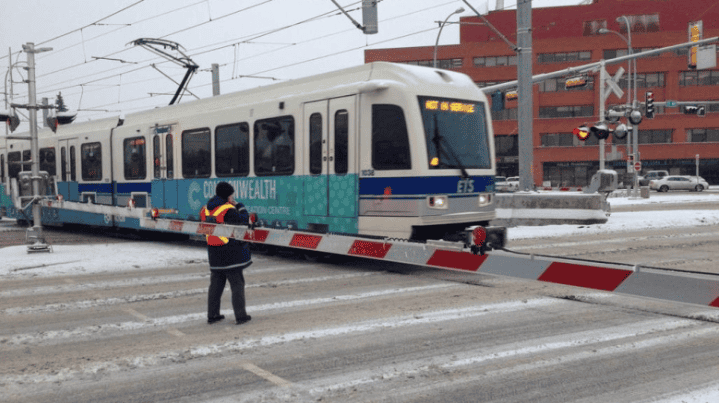
Contractor ‘extremely disappointed’ in city’s ‘commitment to the failure of this project’
The City of Edmonton has officially severed ties with the company behind the Metro Line LRT’s problem-riddled signalling system.
Thales Canada Inc. was served a notice of termination on April 4, the city confirmed in a news conference Tuesday.
“This is the end of the line for Thales,” Mayor Don Iveson told reporters. “Thales has consistently let Edmontonians down in delivering on their contractual obligations.
“The signalling system they delivered to the city isn’t complete, isn’t reliable, has not worked.”
Iveson said there was “ample evidence” to support the termination. The decision was unanimously supported by council, he said.
The city said field testing of the system, which began in December, found that the Thales system couldn’t keep trains on schedule and caused trains to stop suddenly.
‘Enough is enough’
“We are not the first city to experience significant reliability issues with Thales,” Iveson said. “Their shortcomings are well documented, from New York to Singapore to Hong Kong.
“The City of Edmonton has given Thales ample time, five years in fact, and plenty of resources to complete their work but enough is enough and it’s time to find a resolution on the Metro Line without Thales.
“We will now move forward with a different signalling system that will deliver the LRT we all expect and deserve. And this isn’t about picking a scapegoat, it’s about accountability.”
The termination will not immediately change Metro Line operations, the city said. For now, Metro Line trains will continue to operate on current schedules using the “incomplete Thales signalling system.”
City sought settlement, Thales went ‘public’
City manager Linda Cochrane said administration made every effort to find a resolution to the ongoing contract issues before the termination notice was served.
“We issued a formal notice of termination to Thales and proposed that it remain confidential so we could attempt to reach a settlement but Thales has alternatively chosen to go public,” Cochrane said.
Thales said its employees were escorted from the worksite last week.
“Thales is extremely disappointed in the city’s commitment to the failure of this project and its abandonment of the objectives to achieve a better LRT service for Edmontonians,” Thales said in a harshly-worded news release earlier Tuesday.
“Thales regrets this decision and will vigorously pursue appropriate remedies with all means available to us.”
Company officials held a news conference Tuesday morning at Manulife Place in downtown Edmonton.
“This is absolutely not the message Thales wanted to be delivering today,” Dave Beckley, ThalesCanada’s vice-president of customer service, told reporters. “Despite years of challenges on this project, we never walked away.”
The cancellation of the contract is unprecedented in the company’s history, Beckley said.
“Every job I’ve worked on has had surprises … and we’ve worked through them with the strong and solid support of our customers, and unfortunately that has not been the case here.”

Thales said it stands by its work on the LRT line and “thousands of hours of testing on the system” have demonstrated that both the Metro and Capital Lines are ready for full service.
“Instead of working with Thales to deliver a successful service to LRT riders, and after years of unprecedented interference in this project, the city spent months conducting its own testing in a manner contrary to industry standards, while contemplating a fundamental change to the Metro Line signalling scheme.”
Thales said that since work on the Metro Line began in 2011, the city has continually asked for changes to the system which fall outside the original scope of the project, including automated train operators and the introduction of special train service to NAIT.
‘Thales will not be a scapegoat’
A city plan to remove all Thales equipment from the transit system demonstrates a disregard for Edmontonians’ investment into the project and will waste millions of dollars, Thales said.
Any alternate transit plan will only lead to future traffic disruptions for Edmontonians, the company said.
“Despite these extraordinary efforts, Thales continued to witness a fundamental lack of leadership from the City of Edmonton on this project,” Beckley said in the news release.
“Thales will not be a scapegoat for the city’s lack of experience and understanding of [communications based train control] systems. It is this type of challenging work environment that contributed to the failure of this infrastructure project, shortchanging Edmontonians and ultimately eroding trust in the LRT.”
In May, the city issued a notice of default on the signalling contract after Thales Canada Inc. failed to fix the system by council’s April 30, 2018 deadline.
Under that notice, the company committed to a new deadline of Dec. 4, 2018.
City has withheld $22 million
On the day of the deadline, Thales announced the signalling system was fully functional. The same day, the city announced that it would put the signalling system through a series of tests to ensure it was working properly.
The city has paid Thales $33 million but has withheld a further $22 million.
The Metro Line LRT stops at MacEwan University, the Royal Alexandra Hospital and NAIT and has more than 34,000 riders per week day.
The $600-million line has been plagued by problems since it opened more than a year late in September 2015. An audit that year revealed the contract with Thales was poorly managed, and that updates and delays weren’t communicated properly to city council.


